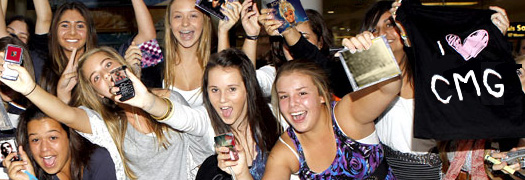
Features | Lists
By The Staff

50 :: Glasser
Ring
(True Panther)
Sometimes these things don’t take very much time: late last year Glasser was but a moniker for Cameron Mesirow’s one-woman GarageBand grooves, but in 2010 they became a full-bodied (well, four-bodied) band and put out their first LP, the radiantly maximalist Ring. In a landscape overpopulated with lo-fi-come-latelies, Glasser’s transformation is a testament to the glory of intimate songs that embrace bold, glossy production. From the opening throbs of “Apply” (a track that appeared on the 2009 EP in an earlier, less assured form), the crystalline mix teases out a gorgeous warmth in Mesirow’s voice and the quaking bass of a synth heartbeat that pumps underneath the entire record.
There’s something about the way the instrumentation on Ring seeps into Mesirow’s vocals that feels downright organic—not in the “put this on a mixtape for Michael Pollan” sense, but in the “composed of carbon,” living, breathing, pulsating, and weirdly amniotic sense. Take “Home,” the steward of one of the best and most unabashedly high-flying choruses 2010 got to call its own. Over a collage of handclaps, thunder, and xylophone trills, which pulse with an almost biological rhythm, Mesirow leads the way to a one-word chorus, the titular polysyllable refracted dazzlingly as if through a prism. The vaguely new-age-y lyrics on Ring aren’t much to speak of, but in most cases the meaning of what Mesirow sings isn’t really the point; she stretches words out past the point of abstraction and clear on through to meditation. Some critics have knocked Mesirow for not being weird enough and dismissed Ring rather irrelevantly as the Portable Vespertine (2001), but it’s the welcoming accessibility that gives the record much of its unpretentious charm. Mesirow’s songs do retain some of the personal candor of her solo recordings, but they’re now able to embody a more expansive vision. Ring is the invigorating sound of bedroom pop dynamiting the ceiling and reaching for the sky.
Lindsay Zoladz

49 :: No Age
Everything in Between
(Sub Pop)
It’s fitting that No Age should be on this list at a number like 49, just barely shrugging their way into the top 50. Whatever. That’s cool. Members Dean Spunt and Randy Randall are the quintessential California kids: laid-back skate punks who’ve turned effortlessness into a career. Though not as reckless and dreamy as Nouns, their 2008 sophomore effort, Everything in Between is winning because of its weightlessness. No Age have figured out how to write more hooks, and tracks like “Glitter,” “Depletion,” and “Common Heat” are surprisingly straightforward slices of pop. But the album is still hard to get a grip on, because once side A comes to a close, things get a little fuzzier, headier, more confusing. The closing anthem “Chem Trails” demonstrates the way No Age half-bake what other bands would trump-up; instead of grounding the album it floats away a bit, just short of satisfying.
Everything in Between is—it must be—a carefully assembled piece of work, but between Spunt’s chirpy off-key vocals and Randall’s thrashing guitar, it sounds like a record tossed off in a friend’s garage. No Age records feel, at times, akin to a rickety wooden roller coaster: the thrill lies in how dangerously close it gets to going off the rails. But deep down we know all is under control; we climb on for another ride. And Everything in Between may be a second ride, but it’s also an affirmation of a great formula. A stroke of brilliance, actually, because uninterest and accidental success are rock ’n roll myths we all want to believe in.
Maura McAndrew

48 :: Pop Winds
The Turquoise
(Arbutus)
So, I think I finally get what IDM means. Not that IDM is how Pop Winds likely describe themselves, nor is it a label electronic aficionados are likely to extend to such wholehearted, hook-riddled un-pop gems. It’s not a term I particularly like anyway—why not just get literal and call it “better-than-dance-music”? But if, in a moment of weakness, I ever glance down my nose and let a term like “intelligent dance music” mince out of my mouth, I hope to be speaking not only of something intelligent, but also of something you can dance to occasionally. Because, aside from the sorts of people so single-mindedly determined to grind that they can dance to wallpaper patterns (yeah, you know those people I’m talking about), when was the last time you saw someone dance to Matmos?
Pop Winds, on the other hand, are producing the kind of temporal lobe-massaging electro-psychedelia that also makes you want to move. Or sway, at the very least. The Turquoise rarely gives in to big bounce, but low-level gyration abounds. The band’s off-kilter beats are not the torque behind the hip-twisting; rather, the gorgeous synth layering and ebbing melodies are what make this album compelling, and what make it such a full-body experience. Tracks like “Perennial” and “The Turquoise” beg listener involvement, while entirely avoiding song structures that allow for dancefloor predictability. Calum got it right in his review: despite its utter listenability, this isn’t pop. Pop is constantly aiming, planning trajectories, and calculating the step-by-step ascent to musical climax. Pop Winds, however, prefer to meander, avoiding easy pay-offs and trite celebratory refrains, instead offering something more holistically rewarding. “Rock music is sex,” Frank Zappa reportedly said. By the extension of the metaphor, Pop Winds are (neo)Tantra. Of course, that’s an even more embarrassing label than IDM, so let’s just say Pop Winds are making out. After all, it takes a little patience, but it’s an art.
Jessica Faulds
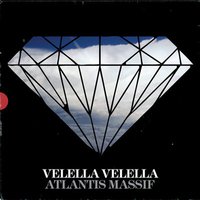
47 :: Velella Velella
Atlantis Massif
(Self-released)
With Atlantis Massif, Vellella Velella treats vocals—sincere, falsetto soul—as if they’ve never been introduced before. So focused are these songs on the dynamics, harmonies, and swagger of the lyrics, Velella Velella pretends their heretofore instrumental stew was only precursor and warm-up to what they could really do with their mouths.
While Massif doesn’t reward concentration quite as intensely as 2005’s The Bay of Biscay, the band’s demonstrating a new, thrilling immediacy to their music. “BBQ Claus I & II” starts with a noisy test transmission of a loop, segues into nerdy dancefloor call-and-response (”Show me some of your karate now / I run a little Liberace now!”), and then settles nicely into a complementary female vocal. It’s white indie rock to the core, but it’s mostly blissful, confident, and genuinely funky, a real DJ’s friend that never overcompensates for its pedigree with noise or foolishness or cheap four-on-the-floor fodder. Because it shouldn’t have to anyway. This is music totally without expectations—without the lounge-flavored downtime of Biscay, instead an overflowing of songs like “Fine Corinthian Leather,” built on a trebly guitar riff, gigantic, ornery bass, and then the creeping in of flute and vibraphone. It’s a song laser-sighted at our feet, and Massif is an album showcasing an obvious focusing of the band’s talent, their unhinged exclamations and wide-ranging talents brought fruitfully, fetchingly forward.
Chris Molnar

46 :: Titus Andronicus
The Monitor
()
Few bands raging this hard have had the purpose and vision of Titus Andronicus. In just two albums they’ve proven punk rock needs rebirthing—evidence be damned—but have taken to this need through the back door, with the literary flair of Nelson Algren’s ghost, the vocal intonation of a lunatic Conor Oberst, and the conceptual scope of a young Bruce Springsteen. Hot off the heels of the claustrophobic but expansive slow-burn of their self-titled debut (2008) and subsequent sweat-filled tours, Titus has returned with The Monitor, a sophomore record filled with hefty hooks, the Civil War, modern day desperation, and the aforementioned fever to represent punk for those who believe it needs a new lease on life.
To be sure, I’m talking about The Monitor as a fucking classic—I can find no other way to describe how naturally the twisted architecture of frontman Patrick Stickles’ mind plays out via the limbs and trunks of his distorted but articulate ensemble. I recall talking to Stickles two years ago, asking about the follow-up to the first album. He looked at me, his face part wild eyes and part sniper focus, his finger pointing to his head: “It’s all up here, man. I have every song, every lyric all written out up here. I just need to cough it up and teach it to the band.” Whatever happened between that conversation and the arrival of this detonation of artifice is both logical and nothing short of magic. The Monitor is a holy shotgun blast, an intelligent amphetamine, and a pleasant wake all rolled into one. Don’t call it a comeback; call it a syllogism: if punk rock is dead then Titus Andronicus is alive and well.
Andre Perry

45 :: Baths
Cerulean
(Anticon)
Will Wiesenfeld, the artist also known as Baths, strikes an immediately stark impression when seeing him live. With glasses and giant sideburns disguising most of his facial features, he sways side to side, eyes closed, head tilted towards the ceiling, singing through a comically wide smile. Sound rushes in and out of the room at the simple twist of a knob, the gesture as slight as the sounds ephemeral. Sometimes he’ll go easy, just looping his excited, breathless exclamations, and one can nod along, can wander in the washes of synth, the simple samples that tie the synths to the beat—piano, bass. But then there’re the lyrics to “Hall”: “Leaving out all sound / Feeling that tall now / And I call all around / The sound filling hall.” That assonance, the “all” sound, is spread out over five notes, Wiesenfeld’s vocals embodying the sentiment of the lyrics and saturating the track. Take the thin, wimpy pressure of a Jónsi joint parceled into a thousand small inhalations and exhalations instead of stretched over ten minute builds. This is urgent, immediate music—listen to Cerulean as loud as possible; anything quieter misses the point.
Chris Molnar
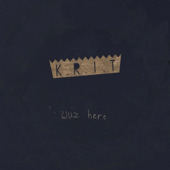
44 :: Big K.R.I.T.
K.R.I.T. Wuz Here
(Self-released)
When I first listened to Big K.R.I.T.’s debut record the crushing Chicago summer heat began to wrap its beefy arms around the city; so had isolation begun to bear-hug my psyche. I had not seen my hometown, situated on the edge of a different great lake, in six months, and the reality that it would be another six before any sort of return was beginning to feel like an impossible challenge. Amongst half-emptied boxes in a new apartment, I plopped down on the futon and began to click through a handful of rap blogs. Bubbling up from my tinny computer speakers a half-hour later was aural contentment; I felt a surge of ineffable comfort.
Wuz Here is draped in a Dungeon Familial glow; its wobbly swagger is downright heart-healing. Paradigmatic of this quality is “Hometown Hero,” a track with such beautiful romantic nostalgia in its jaws, if Conor Oberst heard it he would finally leave us all alone. It evokes at once the Mays and Junes of high school; long, circuitous drives; and the walks that came before any of us could drive. When the chopped and screwed hook drops and the sample coos, I momentarily sit, chuckling, on my best friend’s sofa. We’re about to run to the liquor store; our ratty little town will be a massive playground tonight.
It’s powerful stuff is my point. Wuz Here offers up a punctiliously crafted excess of such solace. K.R.I.T. talks a big game, but he frequently sounds like a guy who jangles his chain just to prove his existence to himself. Neck-deep in quicksand, he concludes his document with a mantra. Over a quasi-Gothic beat, he recites, “Get money, get money, get money / Breathe.” That “breathe” feels so internal it nearly collapses in on itself—a thimbleful of hope in a shitstorm of angst. He’s just trying to get his shine on. And we all want a warm living room in this cold world. Or a cold living room in this hot, stinkin’ world. Here’s to air conditioning and security blankets.
Colin McGowan
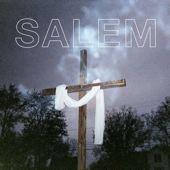
43 :: Salem
King Night
(IAMSOUND)
Sometimes discourse just gets in the way. King Night was doomed from the outset to be a victim of its creators’ sudden popularity, arriving as it did as the unofficial inaugural work of a micro-genre despised before it even fully emerged. “Witch house,” like chillwave before it, seemed like a bad joke to everyone before anyone really knew what it was, and in its turn was deemed both trending topic and dead on arrival at the same time. The tragedy here, of course, is that many of the bands who are said to compose the label are genuinely great, and as a fresh, distinctive aesthetic the genre itself strikes me as incredibly exciting: King Night, along with Grimes’ Halfaxa and, to a lesser extent, How To Dress Well’s Love Remains, simply doesn’t sound like anything else out there. Salem boast a wealth of identifiable influences, sure—the most notable (and widely cited) being DJ Screw—but with King Night they’ve managed to accomplish something so rare that hearing it for the first time is a minor revelation: they’ve managed to create something new.
They also managed to produce one of the most divisive album of the year, which ended up being to their own detriment. Those put-off or repelled at first glance—this is jarring, sometimes unnerving stuff, after all—took to derision fiercely, and any murmurs of a positive critical response only increased the fervor with which detractors of the band, as well as the trending microgenre altogether, railed against it. That scorn eclipsed the music right from the beginning, demanding in turn that everyone register an opinion immediately. And so poor King Night, a record with much to parse beyond its Houston-cum-Halloween exterior, gets rejected out of hand, dismissed as too-trendy freakshow crap. We’re the ones who lose, though—not because we miss out on a remarkably singular new album (though if you skipped King Night, you really are missing out), but because we continue to allow bullshit white noise to impede our ability to not only enjoy but even just listen to music.
Calum Marsh

42 :: Swans
My Father Will Guide Me Up a Rope to the Sky
(Young God; 2010)
December 1, 2010 – CMG Mansion
[All CMG staffers sit at a long oak table in the dining area. Our butler, aka Chad VanGaalen, hands out individually-laminated typewritten sheets of paper on golden clipboards detailing the divvying up of year-end duties.]
Joel: This must be some kind of joke.
Scott: The foie gras? Don’t worry, it comes out of the expense budget.
Joel: No. …Swans? You’re making me write about this album again? After I nearly obliterated myself in contradictions last time? Am I the one who gets thrown in the pyre since I’ve already been burned?
Scott: You mean baptized? Maybe I assigned this album to you in the hopes you’d finally stop trying to qualify how much you love it.
Joel: I gave it an 84. It felt like judging an ocean based on how well it gets you wet. I wasn’t kidding when I refused to openly recommend it to our readers.
Scott: Do you think Gira gives a damn about you and your personal reactions to it? This shit sounds like everyone’s pain and narcissism. It is egalitarian in the most uncompromising way imaginable.
Joel: But why does it feel like such a chore?
Scott: Wait, you’re telling me you don’t think “My Birth” is just balls-out fun? Can’t you picture Gira in that ridiculous cowboy hat, hiccups in between verses, Nick Cave limp-dick standing in the corner? Have you even seen this band live?
Joel: Uh…I was afraid to.
Scott: Afraid of what? Jean jackets? Did you ever consider that you were drawn to this band in your teenage years not out of some existential despair but the same boredom and self-absorption that drove every other punk to embrace the caged pitbull aesthetic? Have you ever thought that this album might be more Texas Chainsaw Massacre than The Road? Doesn’t “Reeling the Liars In” remind you of the same late ’70s meta-violent Americana of Eraserhead and Darby Crash? Isn’t its straight-faced evocation of assembly-line torture kind of funny and a little bit quaint?
Joel: But doesn’t Gira invite these self-serious interpretations? “You Fucking People Make Me Sick” still makes me cringe.
Scott: And yet why is it we connect little girl + weird lyrics + Devendra Banhart into exploitative tale of pedophilia? Do you see a Steve Albini co-credit? Does Luis Bunuel need to direct the film version of this album for you to see its level of self-awareness?
Do you remember that Talking Heads song “Listening Wind,” how its blank-faced evocation of terror suggested a level of ambivalence that might finally force pop to come to terms with its own innocuousness? Do you remember how liberating it felt to think that music could be free of judgment? No words? No thoughts?
Joel: …
Joel Elliott
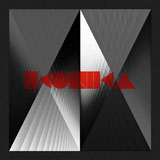
41 :: Ikonika
Contact, Want, Love, Have
(Hyperdub)
If you’ve read this far then you’re probably part of Generation Y: the “children” of the ‘80s who’ve turned Peter Pan and whose memories are marked out by Coke commercials (it’s at this time of year you start worriedly channel-hopping, watching if the holidays are coming). The remaining 50% of the Echo Boomers’ minds are filled with Sega games, and it’s this side of the brain that Ikonika taps into, neatening and feeding it with bass bins. Sara Abdel-Hamid could be the ambassador for the blog-era success story: a lurker over at dubstepforum.com, her demo embeds caught the attention of Kode9, who took no time at all in signing her to his coveted Hyperdub. Debut 12” Millie gradually took off—bought by forumites, then by DJs, and finally by eagle-eyed broadsheet hacks who were keen to keep dubstep in the art supplements. Ikonika was on her way, and Mille became just one of several twelves that was worked into Contact, Want, Love, Have, Abdel-Hamid’s tribute to 32-bit shoot-em-ups and the rave tapes played to her by her sister.
Designed as a loose concept album (theme: player carves his/her way through a no-saves platform game in the vein of Choose Your Own Adventure by Team Doyobi), Ikonika made her debut as exotic as possible given her crunchy and pre-programmed parameters. It’s easy to see why she occasionally hops labels to the more electro-friendly Planet Mu: rich in those devastating low frequency attacks that Hyperdub nuts crave, Contact… shoots toward you like a long wave of polygons, as if you’re expected to look at things with Robocop vision. If Burial’s Untrue (2007) was the sound of Outer London snuggling up with anguish, Ikonika’s city flashes and purrs; a thousand bedroom consoles continuously whirr in unison.
The slot machine payout of lead single “Idiot”—whose 8-bit dubstep could so easily nauseate if left to simpler, less dexterous thumbs and fingers—sets her vision out in blocks, its brutal rhythms bouncing furniture off the floor while one cheeky synth goes ballistic. That same synth is stretched into the echo of some 20-year-old house track on “R.e.s.o.l.,” where the crystal sirens and earsplitting bass eat up jungle like Starbucks. These tracks are strictly instrumental, by the way, with no girl-next-door vocals smudged on for added urban alienation. Ikonika is the girl-next-door, and the only thing she’s moaning at it is the screen that reads GAME OVER/NO CONTINUES/TRY AGAIN? It may not be groundbreaking but Contact… does the miracle of making hoovers feel warm and like lullabies. Lesser men here would make a sexist joke. Lesser men have been hit before with hoovers.





